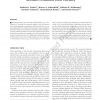Free Online Productivity Tools
i2Speak
i2Symbol
i2OCR
iTex2Img
iWeb2Print
iWeb2Shot
i2Type
iPdf2Split
iPdf2Merge
i2Bopomofo
i2Arabic
i2Style
i2Image
i2PDF
iLatex2Rtf
Sci2ools
121
click to vote
JOCN
2010
2010
"Virus and Epidemic": Causal Knowledge Activates Prediction Error Circuitry
■ Knowledge about cause and effect relationships (e.g., virus– epidemic) is essential for predicting changes in the environment and for anticipating the consequences of events and oneʼs own actions. Although there is evidence that predictions and learning from prediction errors are instrumental in acquiring causal knowledge, it is unclear whether prediction error circuitry remains involved in the mental representation and evaluation of causal knowledge already stored in semantic memory. In an fMRI study, participants assessed whether pairs of words were causally related (e.g., virus–epidemic) or noncausally associated (e.g., emerald–ring). In a second fMRI study, a task cue prompted the participants to evaluate either the causal or the noncausal associative relationship between pairs of words. Causally related pairs elicited higher activity in OFC, amygdala, striatum, and substantia nigra/ventral tegmental area than noncausally associated pairs. These regions were also more a...
Causal | JOCN 2010 | Prediction Error | Predictions |
| Added | 28 Jan 2011 |
| Updated | 28 Jan 2011 |
| Type | Journal |
| Year | 2010 |
| Where | JOCN |
| Authors | Daniela B. Fenker, Mircea Ariel Schoenfeld, Michael R. Waldmann, Hartmut Schütze, Hans-Jochen Heinze, Emrah Düzel |
Comments (0)

